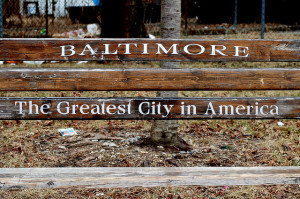Written by St. V’s former Jesuit Volunteer, this areticle was originally published in St. Vincent’s quarterly publication, Together Sharing Christ along with a letters from Fr. Dick and Chris McCullough as well as articles by Anne Maura English. To see the full issue, click here.
By Kieran Ruppert
As far as years to live in Baltimore go, I feel like I picked a real doozy. I was here to see Ray Rice’s suspension, the celebration of the 200th anniversary of the Star-Spangled Ba nner, the Orioles’ downright decent 2014 post-season and parts of the city burn as a reaction to a complex intersection of long-term racism and class divides exacerbated by state sanctioned violence against citizens. It has been a fun and formative year.
nner, the Orioles’ downright decent 2014 post-season and parts of the city burn as a reaction to a complex intersection of long-term racism and class divides exacerbated by state sanctioned violence against citizens. It has been a fun and formative year.
That’s right; my article here is yet another bit of noise in the cacophony of people talking about the social unrest in Baltimore who should really just learn when to keep their mouths shut and their fingers off the keyboard. But here we are. Talking about the rioting without talking about the long-term abuses of power and where they came from is generally a waste of time, so let’s make sure we hit on that before moving on.
The riots did not happen in a vacuum of context. There have been years of the police, their power without proper constraints, leading up to this. This is not to say that rioting was a good reaction, but given the options of voting for people who ignore peaceful protests and requests that the state stop oppressing folks or joining the mob that is rushing into CVS to do what the police are there to stop you from doing, I can see why some people went for the latter. And of course, this is a gross oversimplification.
There is the fact that burning the CVS on North Ave. is not likely to inspire folks who have money to invest it in that area. There are the people who did work at that CVS who are presumably not better off without a place to work. But again, given the options of wasting your time by working within the system as the police continue disproportionate racial harassment and wasting time by lashing out against the system through rioting, at least you get some free stuff and a feeling that you subverted the system that works against you by rioting.
But the really interesting thing to look at is not the rioting itself; it is how we move forward. We can collectively give ourselves a pat on the back for just how many people went out Tuesday to clean up the mess that was made on Monday. Baltimore is not only made up of hoodlums who take advantage of the tragedy of systemic racism and Freddie Gray to get what they can at CVS; it is a city of honorable citizens who will clean up after those who make messes. This was a good thing. The hard part is to not see the riot as a bad thing and the clean up as a good thing and to assume the scales have been balanced.
The difficult thing now is to look at what policies the police department has that inherently lead to the oppression of poor and black people. As an example, some discussion of how to less than 30% of Baltimore officers live in the city limits and how that could make them look like an occupying force and how to change these numbers could be helpful. Marching for a vaguely defined notion of justice is nice, but focusing on specific problems and how to maybe resolve them is useful. Or maybe it will be a waste of time just as every march for justice has been, but hey, maybe let’s give it a shot.
And we have inevitably reached the point where I make this about our Park. The important work to be done both in the city and the Park is not work that can be done quickly. We cannot labor to reform the police department and then be any less vigilant about the department’s state sanctioned abuse of power a year from now. Similarly, opposition to building permanent supportive housing in our Park does not help acknowledge the dignity every person deserves if it is not followed up with action.
The best action I can imagine without everyone taking a year off to be the Jesuit Volunteer at St. Vincent would be talking to the folks in the Park. That could mean regularly coming to Mass a half hour early to get to know some folks. It is not necessarily about bringing food, though I would imagine that could not hurt.
The important action is not giving out money or food out of pity; it is getting to know people in the Park as you would anyone else. We are to make it clear through interactions, as often as is reasonably possible, that all are welcome into our church. Maybe this is a way of seeing Christ as the stranger just outside our church and welcoming him in so we can better know him. This is one way we can work for social justice on our church property so we may see Christ more clearly and he can move closer to us. It is not a single grand event, but over time those may not be necessary anyway.

